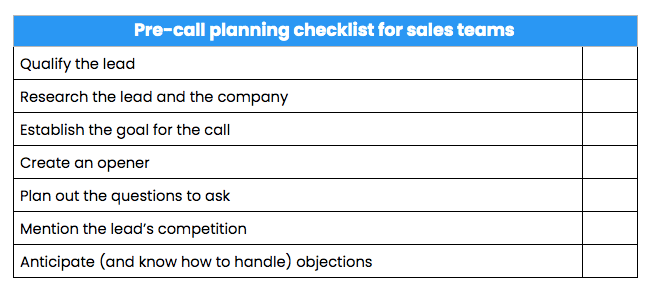Pre-call planning template for sales teams

Did you know that it takes 18 calls on average to actually connect with a buyer? In such circumstances, there’s no time to waste – and you can easily maximize this time with proper preparation. Here’s how to make the most of your sales calls with pre-call planning.
For many years now, phone calls have been treated as one of the most effective tools salespeople have at their disposal. Nonetheless, talking on the phone is only half of the whole process. The other half is what happens before a salesperson picks up the phone and makes the call.
There’s no doubt that planning is essential for every business activity. In fact, many enterprises are said to miss the equivalent of even 10% of annual sales due to lost opportunities that stem from poor planning.
Pre-call planning falls into this category as well. Basically, if your sales agents don’t do their homework, they might simply miss out on business opportunities. Luckily, this is easy to fix with a pre-call planning template for your sales team, said Jared Williams, director of marketing at Essay Tigers.
Learn more about cold calling
What is pre-call planning in the first place?
Essentially, pre-call planning is the research process that goes into preparing for a sales call. It might not seem like much, but it’s one of the core elements of the sales strategy. How come?
Gone are the days where sales agents could simply dial a random number and hope for the best. Nowadays, closing a deal requires proper lead qualification, pre-call research, and preparation.
The benefits of pre-call planning
Thanks to pre-call planning, your sales agents can be better prepared for actual sales conversations, anticipate questions, and answer them effectively. It’s mostly because a pre-call plan helps them focus more on the task at hand and truly engage with their interlocutors afterward.
Pre-call planning also helps to make the most of every call and maximize each opportunity. Let’s face it: your agents have to work hard to even get a chance to have a meaningful conversation with a prospective customer. If they “walk-in” unprepared, they might easily blow this chance off.
In fact, whenever your sales agents are about to discuss something that they’re not prepared to talk about, they lose the ability to communicate with ease and confidence.
At the same time, being prepared doesn’t only make them sound more confident, but also more flexible. Sometimes, despite all pre-call planning, things just don’t go as expected. However, if your agents take some time to get to know their interlocutors first, they can adapt more quickly and still handle these unexpected turns.
What to do before every sales call, then?
It’s always worth giving the whole process some thought and starting with qualifying the lead. Not all leads are equal – in the end, it’s better to have a shorter list of contacts with a higher potential to purchase, rather than a long list that will require much more pitching to sell to.
Don’t be afraid to let go of leads: your team will actually have better chances of closing those that have been carefully selected and qualified.
How to make sure you’re calling the right people? To make it easier for your team, you should build an ideal customer profile based on the characteristics of your target audience. Then, it will be easier to check whether the leads fall under this category.
This essentially means that before picking up the phone, your sales agents should look into their leads and research them as thoroughly as possible.
This will help them establish whether the potential interlocutors are actually interested in your business and intend to buy from you. This can also help to tailor the sales pitch to lead’s business needs. To give you an idea:
- 19% of buyers want to connect with a salesperson during the awareness stage of their buying process (when they’re first learning about the product),
- 60% want to connect with sales during the consideration stage after they’ve researched the options and come up with a shortlist,
- 20%, on the other hand, want to talk during the decision stage, once they’re decided which product to buy.
When asking the right questions and showing how your product and service can be used in specific cases that the lead is familiar with, your sales agents have a higher chance of closing the deal.
Pre-call planning: Where to look for information?
Search engines and LinkedIn profiles can be extremely useful during pre-call sales planning, as they can help to discover the contact’s company, role, and other relevant details. Your agents might also want to look for things they have in common with the prospects to establish rapport more easily.
Of course, the more information they can get out of simple web research, the better – the ultimate goal of any pre-call planning activity is to be well-informed on the call. Don’t just pick up the phone with the intention to find out as much as possible about your interlocutor.
Take your time to research the company and the actual lead you’ll be making initial contact with. With all these details, it will be easier for you to plan the actual sales call.
What are the elements to consider when planning a sales call?
#1 The goal for the call.
Before making the call, your sales agents should first establish the objective for it. This will depend mostly on where the interlocutor is in the buyer’s journey. No matter the actual goal, though – salespeople who identify it beforehand are said to be more likely to achieve it in the end. Have your team consider the following:
- What specific details do I need to get out of this call?
- What information do I want the interlocutor to have after this call?
- What’s the desired outcome for the call?
- What (if any) are the next steps that should be taken after the call?
#2 An opener.
The truth is that your sales agents have only a few seconds to grab the attention of their interlocutors. If they don’t make a strong first impression, they might lose it immediately. An effective call opener is something that you need to have a proper conversation afterward.
Encourage the agents to start with establishing rapport and stating the reason for the call – this is exactly when the research should pay off.
Watch out for used phrases: interestingly, saying “Did I catch you at a bad time” makes it 40% less likely to book a meeting, while asking “How are you?” increases the likelihood of booking a meeting by 3.4X.
#3 “The right” questions.
Research shows that there’s a clear relationship between the number of questions a sales rep asks and their chances of success. Asking the right questions can help your sales agents show a genuine interest in the interlocutor, and encourage them to at least give your offer a thought.
The best way to handle this part of pre-call planning is to have a list of open-ended questions that your agents can ask throughout the call.
It’s their chance to learn more about specific problems the lead’s business has, and figure out how your product or service can solve them. In fact, more than half of surveyed prospects want to see how the product works on the first calls.
#4 The lead’s competitors.
Yet again, it’s when your sales agents can prove that they’ve done the research. Encourage your sales reps to analyze the competitors and find their strengths & weaknesses. By showing the knowledge of the industry and main competitors, sales agents build trust towards the business they represent.
#5 Common objections.
Every sales-related conversation comes with certain objections. Even though these objections will differ depending on the lead, there are some common ones that your sales reps can get ready for in advance.
You can easily have a brainstorming session with the whole sales team to find out what objections your agents hear the most, and discuss potential courses of action in each case.
Value-added sales call planning tips
1. Create your own sales call planning template.
As can be seen, there are at least a few elements you have to take into account prior to each call. In order to make it easier for the sales team, you can create a dedicated call planning template to guide the whole research & planning process. Here’s an exemplary checklist to take advantage of:

2. Don’t over-prepare.
It’s important to realize, however, that going “off-script” doesn’t necessarily have to be a bad thing. Thanks to pre-call planning, your agents should already have enough information and confidence to let the conversation flow. This brings us to the next point:
There’s no need to plan every single word. After all, you don’t want your agents to sound like robots that tend to panic when the conversation doesn’t exactly go as planned.
It’s important to stay flexible and be able to react to what the interlocutor is saying. The actual conversation should always be more important than a script created beforehand.
3. If possible, create & send the agenda to the interlocutor.
To set the call up for success, your sales agents might want to create and send out the agenda to the prospect first. Creating the agenda shouldn’t be too difficult after the hardest part (the actual pre-call planning) has been done. The interlocutors should appreciate the heads up and get ready for the call themselves.
4. Spare a few minutes before the call.
It’s better not to rush from one call to another – this might easily undermine the whole pre-call planning efforts. Make sure the sales agents schedule all calls with some breaks in-between.
5. Leverage sales tools.
Outbound call center software for sales teams can not only facilitate making & receiving calls by your sales team but also help them keep all relevant details in one place. This way, the whole pre-call planning process gets more organized.
Tools like CloudTalk, for example, allow your sales team to manage all the contacts and calls, as well as collaborate when closing deals.
6. Take action after the call.
In many cases, finishing the call is not the end of the story. There might be some actions that your sales team should take afterward, such as send a summary of the call to the interlocutor, plan a follow-up, or discuss the case at hand with the team. Make sure your team is aware of that.
Ready for proper sales call planning?
In case you still have doubts: planning before every sales call is worth the time it takes. Of course, research is an important part of the pre-call procedure, but there’s no need to study the company for hours.
Let your agents be smart about the whole process and find a pre-call planning method that works for them best. In case there’s some guidance needed, take advantage of the pre-call planning checklist for the sales teams above.
Remember: Being prepared and equipped with the right tools always pays off. Let pre-call planning & CloudTalk help your team make the most of each conversation.
















